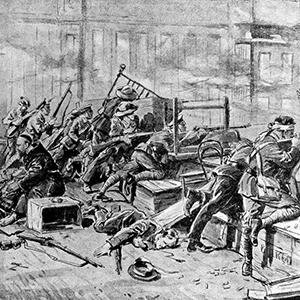When rebels took up arms to oppose British rule in Ireland 100 years ago, church leaders were caught between fixed church teaching and changing public opinion
Patrick Pearse heralded the outbreak of Ireland’s Easter Rising at noon on 24 April 1916 by reading the Proclamation of Independence outside Dublin’s General Post Office. Among the groups orchestrating the attempted revolution was the Irish Republican Brotherhood (the Fenians), a secret oath-bound organisation solemnly condemned by the Catholic Church on several occasions. One might have expected that this would have been sufficient reason for bishops and clergy en masse to denounce the enterprise.
Seven bishops and a number of prominent priests did condemn it. Among them was the Auxiliary Bishop of Tuam, Dr Michael Higgins. Not only did he decry the rebellion as “mad and sinful”, he also warned people to have nothing to do with secret societies. But it might seem strange that more bishops did not take a vigorous public line.
In private, their lordships could be more candid. Joseph MacRory, Bishop of Down and Connor, writing in early May to the rector of the Irish College in Rome, Mgr Michael O’Riordan, declared the Rising to be a “shocking and idiotic tragedy. It was engendered by a few desperate socialists and a few sincere but silly patriots. Of course it had no chance whatever of succeeding. The danger is that it may have succeeded in gravely injuring Ireland’s constitutional cause.”





User Comments (1)